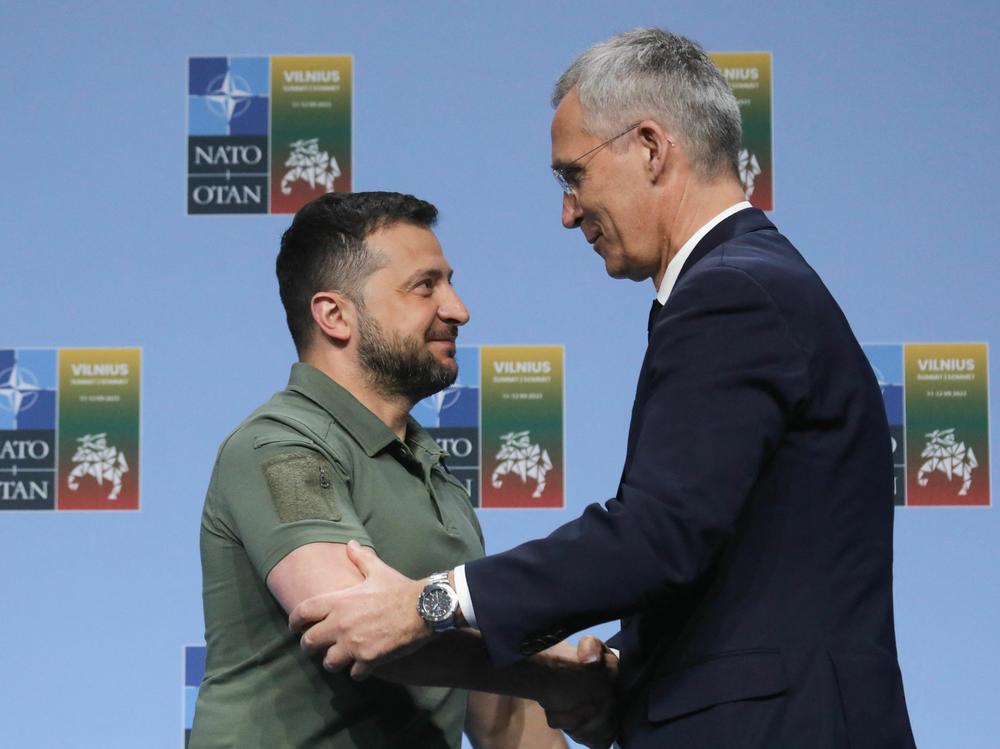Section Branding
Header Content
Key takeaways from this week's NATO summit, according to the group's leader
Primary Content
NATO wrapped up a key summit this week with one new member at the table and two more on the way — a significant expansion of the alliance that, its head says, shows Russia miscalculated when it invaded Ukraine.
"The reality is that [Russian President Vladimir] Putin now is getting the exact opposite of what he wanted when he went to war against Ukraine," says Secretary-General Jens Stoltenberg, referring to Russia's concerns about NATO expanding eastward. "It was a big strategic failure."
The war was front and center at the gathering in Vilnius, Lithuania, where leaders from NATO's 31 member countries discussed support for Ukraine, national defense spending and the makeup of the alliance itself.
Russia's invasion pushed Finland, Sweden and Ukraine to apply for membership last year, though only Finland met the requirements to join in time for the summit.
Turkey blocked Sweden's bid, saying it wasn't doing enough to crack down on Kurdish militant groups that Turkey considers terrorists. But earlier this week, that stance shifted.
President Recep Tayyip Erdogan agreed to withdraw his objection Monday after meeting with Stoltenberg and Swedish Prime Minister Ulf Kristersson. He has since said that Turkish lawmakers would take up ratification in October.
"So this is a good day for Sweden and a good day for the whole of NATO," Stoltenberg says, crediting President Biden with making it possible.
Meanwhile NATO members have agreed that Ukraine can only join after the war ends, in part because earlier admission would draw the rest of the alliance into direct conflict with Russia. President Volodymyr Zelenskyy left the summit without receiving a clear timeline for membership, but with pledges for long-term security assistance from the U.S. and other G-7 nations.
Stoltenberg says the summit has moved Ukraine "closer to NATO membership," but hesitated to speculate about its exact path forward.
"The most imminent task now is to ensure that Ukraine prevails as a sovereign, independent nation," he added. "Because unless Ukraine prevails as a democratic nation in Europe, there is no membership issue to be discussed at all."
By the end of the summit, NATO members also had agreed on plans for countering a potential Russian attack on its territory, and had pledged to put at least 2% of their national GDP toward defense spending (expanding on a previous goal that only a handful of countries have met so far).
Stoltenberg spoke to Morning Edition's Steve Inskeep about how the alliance is changing.
This interview has been edited and condensed for clarity.
Interview highlights
On how NATO regards Turkey
Turkey is a very important ally. They are extremely important in our fight against ISIS ... in Iraq and Syria, the only NATO ally bordering Iraq and Syria. And PKK [the Kurdistan Workers' Party] — it's a terrorist organization in Turkey, but they are also responsible for organized crime in Sweden and in other countries in Europe. So the fact that we now are stepping up our cooperation on fighting terrorist organizations like PKK is important both for Turkey but also for the rest of Europe.
On the significance of Scandinavian countries' membership
It will strengthen NATO. But it's of course also extremely important for the Nordic region, where all our countries are now part of the same security arrangements, are members of NATO, and Sweden soon will be a full member. And by having Finland, NATO's border with Russia is more than doubling ... [Putin] is getting more NATO and more members in NATO.
On what must happen for Ukraine to join
As the situation is in Ukraine now, with a full-fledged war going on, of course that makes it impossible to have Ukraine as a member. Because NATO supports Ukraine, we help them uphold the right for self-defense, but NATO is not directly involved in the conflict. And since NATO is based on the idea of "one for all, all for one" ... we need to find a way to try to make Ukraine a member which doesn't then trigger a full-scale conflict between Russia and NATO.
On NATO's support for Ukraine's counteroffensive
The U.S. has demonstrated leadership, provided [an] unprecedented level of support with ammunition, with advanced weapons systems. And European allies have also stepped up and increased defense spending — record high numbers this year — and also more support for Ukraine. So all our dollars support Ukraine.
The broadcast interview was produced by Naina Rao and Shelby Hawkins, and edited by Arezou Rezvani.
Copyright 2023 NPR. To see more, visit https://www.npr.org.

